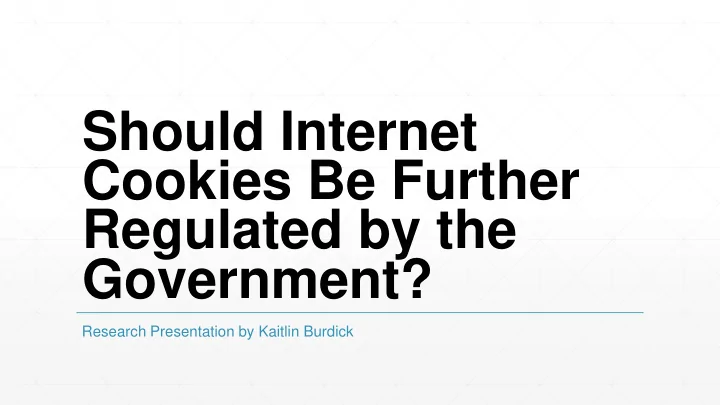

Should Internet Cookies Be Further Regulated by the Government? Research Presentation by Kaitlin Burdick
Overview ▪ Background ▪ Arguments For the Regulation of Cookies ▪ Arguments Against the Regulation of Cookies ▪ Conclusion ▪ Questions
Background Information ▪ Why is this important? ▪ In 2013 74.4% of Americans used the internet (File and Ryan 2). ▪ What are cookies? ▪ Small text files stored on a user’s computer (Gervais). ▪ Why were they created? ▪ To fix the inconvenient memory problem of the World Wide Web (Schwartz). ▪ What information do cookies store? ▪ Non-identifying information. ▪ What are the current regulations on the usage of cookies? ▪ Informed usage of cookies and ability for user to control cookies (Hoofnagle et al.) .
Argument For Increased Government Regulation ▪ Regulations were made in 2010 ▪ Invasion of Privacy ▪ Advanced “respawning” cookies ▪ Third-party data collection
Advanced Cookies ▪ Flash cookies “respawn” upon deletion by the user. ▪ Often hard to detect or find on a user’s computer. ▪ Loophole in current regulations.
Third-Party Data Collection ▪ Tracking over many websites by outside companies ▪ Information is sold ▪ Often can reveal sensitive information Strauss, Valerie. “The Astonishing Amount of Data Being Collect About Your Children”. The Washington Post. 12 Nov. 2015. Web. 28 Apr. 2016.
Arguments Against Increased Government Regulation ▪ Specialization of advertisements ▪ Expected services and applications would be lost ▪ Free market argument
Specialization of Advertisements ▪ Allows ads suited to user. ▪ Ads would become flashier
Lost Expectations ▪ Autofill ▪ Loss of Virtual Shopping Carts ▪ “If there is no information collected, it would be like a constant exchange with an amnesiac,” – David Berkowitz (Learmonth). McFarland, Adam. 29 May 2013. Web. 7 April 2016.
Free Market Argument ▪ Advertisement companies believe consumers are not capable of making informed decision about cookies. ▪ Believe that government regulation is “paternalistic” (Hoofnagle et al.).
Arguments For: Conclusion ▪ Important to understand the - Privacy - “Respawning” background and both sides of an Cookies - Third-Party argument before coming to a Cookies conclusion. Arguments Against: - -Specialization of Advertisements - - Lost Expectations - - Free Market Argument
Questions?
Works Cited File, Thom and Camille Ryan. “Computer and Internet Use in the United States: 2013”. United State Census Bureau (2014): 1-16. Web. 30 Mar. 2016. Gervais, Norman. “Governmental internet information collection: Cookies placing personal privacy at risk.” Bulletin of the American Society for Information Science and Technology 40.2 (2014): 27-31. Web. 27 Mar. 2016. Hoofnagle, Chris Jay, Ashkan Soltani, Nathaniel Good, Dietrich J. Wambach, and Mika D. Ayenson . “Behavioral Advertising: The Offer You Cannot Refuse.” Harvard Law and Policy Review 6.2 (2012): 273-296. Web. 26 Mar. 2016. Learmonth, Michael. “Tracking makes life easier for consumers.” Advertising Age 80.25 (2009). Web. 27 Mar. 2016. Schwartz, John. “Giving the Web a Memory Cost Its Users Privacy”. New York Times ; 4 Sep. 2001. Web. 31 Mar. 2016. McFarland, Adam. 29 May 2013. Web. 7 April 2016. Strauss, Valerie. “The Astonishing Amount of Data Being Collect About Your Children”. The Washington Post. 12 Nov. 2015. Web. 28 Apr. 2016.
Recommend
More recommend